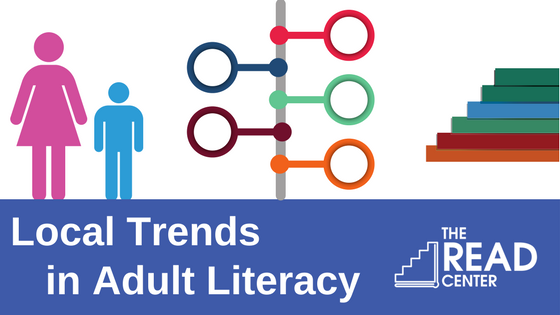ProLiteracy recently released its 2016-2017 Annual Statistical Report of adult literacy programs across the United States. Here is how The READ Center compares:
- When it comes to gender, READ and the nation align pretty closely. READ serves more female students than male, and a strong majority of our volunteers are female also.
- READ serves a higher number of African American/Black students than the national percentage. This could be because many of the other organizations surveyed provide English as a Second Language classes, and READ does not.
- 69% of READ’s students are emergent readers (0-3 grade level). READ focuses on serving beginning readers. They can “graduate” to continue their studies at local adult education or training programs.
- The percentage of READ volunteers who are aged 60 and older is pretty close to the national percentage. Many volunteers come to us in retirement when they have time to give back to their community.
- The READ Center has a relatively high number of individual donations compared to the nation. 95% of READ’s support is private donations. Thank you to all who make READ programs possible.
| Students Served | Locally | Nationally |
| 204 | 216,681 | |
| Gender | Locally | Nationally |
| Female | 54% | 65% |
| Male | 46% | 35% |
| Ethnicity | Locally | Nationally |
| African American/Black | 89% | 18% |
| Asian | 2% | 13% |
| Hispanic/Latino | 2% | 43% |
| White | 7% | 21% |
| Basic Literacy Levels | Locally | Nationally |
| Grades 0-3 | 69% | 24% |
| Grades 4-5 | 22% | 24% |
| Grades 6-8 | 5% | 30% |
| Grades 9-12 | 5% | 22% |
| Volunteers | Locally | Nationally |
| 112 | 88,404 | |
| Gender | Locally | Nationally |
| Female | 79% | 73% |
| Male | 17% | 27% |
| Percentage of Volunteers age 60 and older | Locally | Nationally |
| 52% | 48% | |
| Percentage of Private/Individual Donations | Locally | Nationally |
| 27% | 7% |
All data based on 2016-2017 estimates
More interesting takeaways:
- 93% of READ’s education team are volunteers; 7% are paid instructors.
- Though we have some generous donors who contribute through their United Way employee giving campaigns, READ does not currently receive United Way funding.
- READ is now among the 31% in the nation providing digital literacy services through our revised definition of literacy.
_________________________________________________________________________________________________________________________
You can read the ProLiteracy Annual Statistical Report here. For more interesting news about our students and tutors, visit our news page.


